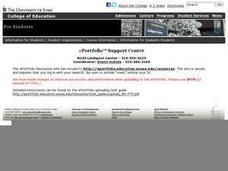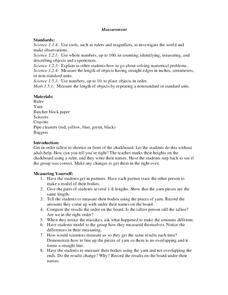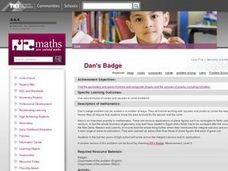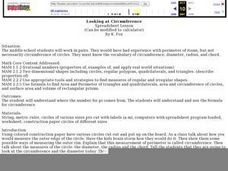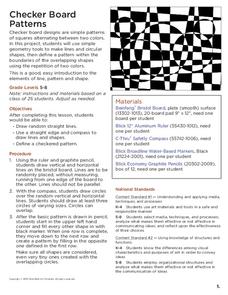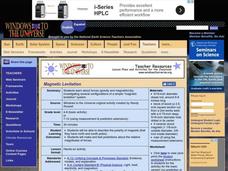Curated OER
Conversions: Metrics Made Easy
Students convert standard units of measurement to metric units using tape measures, meter sticks, rulers, and online conversion calculators.
Curated OER
Tools of the Trade
Third graders explore and identify the tools that can be used to measure length, mass/weight, and volume. They discuss how things are measured using different units, and observe the difference between the English and the Metric systems....
Curated OER
Polygons and Angles
Sixth graders estimate the measurement of angles and then measure the exact distance using an angle ruler. In groups, they explore shapes and recognize the characteristics acute, obtuse and right angles. Students sketch required shapes,...
Curated OER
Sliding Along
Third graders use a ruler that has a bag tie slider attached to it to measure a number of items. While measuring, they complete a "Sliding Along" worksheet and a "Sliding Synthesis Journal." In the journal entry, they include what they...
Curated OER
Max's Math Adventures
In these measurement worksheets, students measure objects in their classroom but don't use a ruler to measure. Students write what they measured and the length of the object. Students then measure the given objects in the classroom and...
Curated OER
Measurement Activity
Students line themselves up from smallest to tallest at the chalkboard with the teacher marking their heights. After recording their names on the board next to their mark, they work with a partner to measure their height using several...
Curated OER
Jim And the Beanstalk
Students read a picture book called Jim and the Beanstalk to investigate measurement. They determine that a measuring tape is used to measure the giant and see that a measuring tape is like a flexible ruler that allows you to measure...
Curated OER
Drawing to Scale
Students examine the process of drawing a picture to scale. They analyze and discuss real-life blueprints for a house, and create a scale drawing of an original invention using calculators and rulers.
Curated OER
Displacement vs. Distance Worksheet
Displacement is a foundational concept for physics pupils. If they are having trouble discerning it from distance, this activity can help clear things up. The first page is essentially a piece of graph paper. It has a compass rose and a...
Curated OER
Bubble Mania
Elementary schoolers practice measuring a soap bubble print. They follow a recipe to make a soap bubble solution. Pupils use the soapy solution to blow large bubbles with a plastic drinking straw until they pop leaving behind a circular...
American Institutes for Research
Digital Smiles
Explore metric measurement, recording data, and creating an electronic spreadsheet displaying results with your math class. Scholars will measure the length of their smiles, record the measurements, and represent the results on an...
Curated OER
Dan's Badge
Students solve a math problem using area formulas of circles and squares. They read and discuss the problem, analyze images of badges, reconstruct the badge from the problem using circles and rulers, and share the solution with the class.
Curated OER
Impact Craters Activity
Lunar explorers perform an experiment to understand the size of the craters on the surface of the moon. They layer flour, laundry detergent, and cocoa powder in a pan to model the lunar surface. They drop marbles from different heights...
Curated OER
Number Addition Race
Practice basic addition facts and measuring skills. In this addition and measurement lesson, students are provided with drywall tape and work in groups of four at a long table. Partners take turns generating addends and marking the...
Mathematics TEKS Toolkit
Am I Related to Myself?
Elementary or middle schoolers use ratios to discover some nearly constant relationships between measurements of parts of the human body. They find and record pairs of measurements and determine the relationship between the pairs. Pupils...
Curated OER
Looking at Circumference
Students understand where the number for pi comes from. They understand and use the formula for circumference. Students measure the circles given out and the diameters of those circles and record the results on their worksheet.
Curated OER
Checker Board Patterns
Make these funky checker board patterns. They will not only add fun decoration to your classroom, but your pupils will be able to practice using simple geometry tools.They will use tools to make lines and circular shapes using a ruler,...
EngageNY
Making Scale Drawings Using the Ratio Method
Is that drawn to scale? Capture the artistry of geometry using the ratio method to create dilations. Mathematicians use a center and ratio to create a scaled drawing. They then use a ruler and protractor to verify measurements.
Utah Education Network (UEN)
The Pasture and the Fence
Beginning geometers use tiles and grid paper to draw and calculate perimeter and area. Rectangles of different sizes are created and then measured to build understanding. The one-inch grid sheet referenced is attached.
Curated OER
Jack and The Beanstalk Estimation
Introduce the day's lesson by reading Jack and The Beanstalk by Richard Walker, and then review the concept of area with your class. We don't always need rulers to measure, though! Teach learners how to use their hands to help us measure...
Curated OER
Centimeters and Meters - Reteach 17.5
In this metric measurement of length worksheet, learners find the 4 real objects pictured and estimate the length in centimeters. Students then measure and record the lengths in centimeters or meters.
Noyce Foundation
Sewing
Sew up your unit on operations with decimals using this assessment task. Young mathematicians use given rules to determine the amount of fabric they need to sew a pair of pants. They must also fill in a partially complete bill for...
Curated OER
SIZING UP SOL
Ninth graders produce a projected, pinhole image of the sun and from measurement of the image and projection distance, calculate the actual size of the sun. They estimate the sun's apparent brightness from different planet.
Curated OER
Magnetic Levitation
A thorough investigation of magnetic levitation; this activity has four parts. First, physical scientists play with a wooden dowel and three disc magnets to review polarity and repelling action. Then they experiment with...


